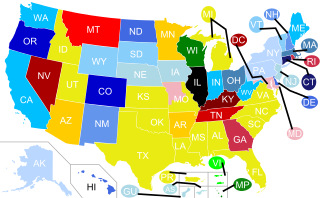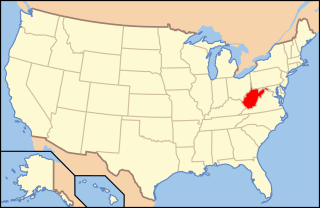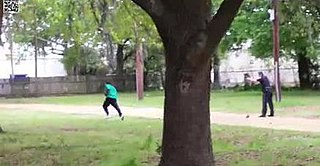A court-martial or court martial is a military court or a trial conducted in such a court. A court-martial is empowered to determine the guilt of members of the armed forces subject to military law, and, if the defendant is found guilty, to decide upon punishment. In addition, courts-martial may be used to try prisoners of war for war crimes. The Geneva Conventions require that POWs who are on trial for war crimes be subject to the same procedures as would be the holding military's own forces. Finally, courts-martial can be convened for other purposes, such as dealing with violations of martial law, and can involve civilian defendants.
Lawrence v. Texas, 539 U.S. 558 (2003), is a landmark decision of the U.S. Supreme Court in which the Court ruled that most sanctions of criminal punishment for consensual, adult non-procreative sexual activity are unconstitutional. The Court reaffirmed the concept of a "right to privacy" that earlier cases had found the U.S. Constitution provides, even though it is not explicitly enumerated. It based its ruling on the notions of personal autonomy to define one's own relationships and of American traditions of non-interference with private sexual decisions between consenting adults.

Sodomy laws in the United States, which outlawed a variety of sexual acts, were inherited from colonial laws in the 17th century. While they often targeted sexual acts between persons of the same sex, many statutes employed definitions broad enough to outlaw certain sexual acts between persons of different sexes, in some cases even including acts between married persons.
The Uniform Code of Military Justice (UCMJ) is the foundation of the system of military justice of the armed forces of the United States. The UCMJ was established by the United States Congress in accordance with their constitutional authority, per Article I Section 8 of the U.S. Constitution, which provides that "The Congress shall have Power. .. to make Rules for the Government and Regulation of the land and naval forces" of the United States.

Courts-martial of the United States are trials conducted by the U.S. military or by state militaries. Most commonly, courts-martial are convened to try members of the U.S. military for violations of the Uniform Code of Military Justice (UCMJ). They can also be convened for other purposes, including military tribunals and the enforcement of martial law in an occupied territory. Federal courts-martial are governed by the rules of procedure and evidence laid out in the Manual for Courts-Martial, which contains the Rules for Courts-Martial (RCM), Military Rules of Evidence, and other guidance. State courts-martial are governed according to the laws of the state concerned. The American Bar Association has issued a Model State Code of Military Justice, which has influenced the relevant laws and procedures in some states.

David Bryan Sentelle is a Senior United States circuit judge of the United States Court of Appeals for the District of Columbia Circuit.

The judicial system of Turkey is defined by Articles 138 to 160 of the Constitution of Turkey.

Robert James "Bob" Conrad Jr. is a Senior United States district judge of the United States District Court for the Western District of North Carolina. He was the district's former chief judge (2006–2013) and a former nominee to the United States Court of Appeals for the Fourth Circuit to take the place of the retired James Dickson Phillips Jr. He is a former member of the executive committee of the Judicial Conference of the United States (2016–2020).

William Byrd Traxler Jr. is an American jurist who currently serves as a United States circuit judge of the United States Court of Appeals for the Fourth Circuit.
Since 2005, federal legislation has been introduced in the 109th Congress, 110th Congress, 111th Congress and the 112th Congress to amend Title 28 United States Code section 1259 to allow members of the United States Armed Forces to appeal court-martial convictions when the Court of Appeals for the Armed Forces denies a petition for grant of review or extraordinary relief. In the 112th Congress the Equal Justice for Our Military Act of 2011, H.R. 3133 was introduced in the House of Representatives and the Equal Justice for Our Military Act of 2011, S. 1664 was introduced in the Senate. Both bills are currently pending.

Lesbian, gay, bisexual, and transgender (LGBT) people in the U.S. state of West Virginia face legal challenges not faced by non-LGBT persons. Same-sex sexual activity has been legal since 1976, and same-sex marriage has been recognized since October 2014. West Virginia statutes do not address discrimination on account of sexual orientation or gender identity; however, the U.S. Supreme Court's ruling in Bostock v. Clayton County established that employment discrimination against LGBT people is illegal.

Lesbian, gay, bisexual, and transgender (LGBT) persons in the U.S. state of South Carolina may face some legal challenges not experienced by non-LGBT residents. Same-sex sexual activity is legal in South Carolina. Same-sex couples and families headed by same-sex couples are eligible for all of the protections available to opposite-sex married couples. However, discrimination on the basis of sexual orientation and gender identity is not banned statewide.
United States of America v. Technical Sergeant Eric P. Marcum, 60 M.J. 198 is a United States Court of Appeals for the Armed Forces (CAAF) decision which, among other issues, upheld Article 125 (Sodomy) of the Uniform Code of Military Justice against a facial substantive due process challenge, and ruled that the Supreme Court's decision in Lawrence v. Texas, 539 U.S. 558 (2003) applied in analyzing as-applied challenges. The decision is thus binding precedent on all courts-martial in determining if an Article 125 prosecution is constitutional.
The Judge Advocate General's Corps, also known as JAG or JAG Corps, is the military justice branch or specialty of the United States Air Force, Army, Coast Guard, Marine Corps and Navy. Officers serving in the JAG Corps are typically called judge advocates.
Kinsella v. Krueger, 351 U.S. 470 (1956), was a landmark United States Supreme Court case in which the Court ruled that the Constitution supersedes international treaties ratified by the United States Senate. According to the decision, the Court recognized the supremacy of the Constitution over a treaty, although the case itself was with regard to an executive agreement, not a "treaty" in the U.S. legal sense, and the agreement itself has never been ruled unconstitutional.
The Judiciary of Sri Lanka are the civil and criminal courts responsible for the administration of justice in Sri Lanka. The Constitution of Sri Lanka defines courts as independent institutions within the traditional framework of checks and balances. They apply Sri Lankan Law which is an amalgam of English common law, Roman-Dutch civil law and Customary Law; and are established under the Judicature Act No 02 of 1978 of the Parliament of Sri Lanka.

On April 4, 2015, Walter Scott, a 50-year-old black man, was fatally shot by Michael Slager, a local police officer in North Charleston, South Carolina, United States. Slager had stopped Scott for a non-functioning brake light. Slager was charged with murder after a video surfaced showing him shooting Scott from behind while Scott was fleeing, which contradicted Slager's report of the incident. The radical difference led many to believe that the shooting was racially motivated, generating a widespread controversy.
Section 839(a) of title 10 United States Code § 925 - Article 125. is a punitive article of the Uniform Code of Military Justice.

Walter Thompson Cox Jr. was an American university administrator and coach who served as the 10th President of Clemson University.